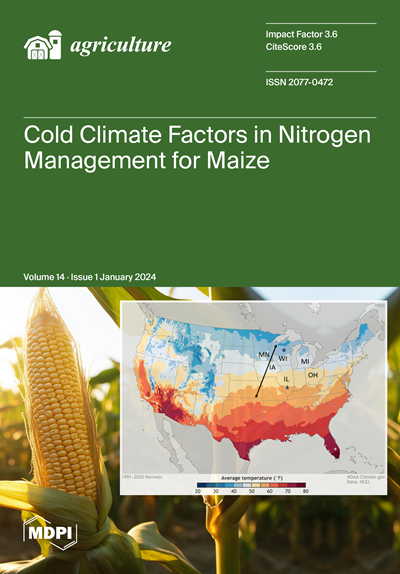Effects of Dietary Galla Chinensis Tannin Supplementation on Antioxidant Capacity and Intestinal Microbiota Composition in Broilers
IF 3.6
2区 农林科学
Q1 AGRONOMY
引用次数: 0
Abstract
The current study aimed to investigate the effects of dietary Galla Chinensis tannin (GCT) supplementation on antioxidant capacity and gut microbiota composition in broilers. Two hundred eighty-eight Arbor Acres broiler chicks were divided into the CON group and the GCT group; each treatment group contained 6 replicates with 24 broiler chicks per replicate for a period of 42 days, and were fed either a basal diet or the basal diet supplemented with 300 mg/kg GCT. Results revealed that GCT supplementation significantly increased glutathione peroxidase (GSH-Px) activity (p < 0.05) and significantly decreased malondialdehyde (MAD) concentrations in serum (p < 0.05) and significantly increased GSH-Px and catalase (CAT) (p < 0.05) and significantly decreased MDA concentrations in the small intestine. In addition, GCT significantly up-regulated (p < 0.05) the gene expressions of nuclear factor erythroid 2-related factor 2 (Nrf2), heme-oxygenase 1 (HO-1), catalase (CAT), glutathione peroxidase-1 (GPX1), and NAD(P)H quinone oxidoreductase 1(NQO1). High-throughput sequencing results showed that GCT supplementation significantly increased abundances of Faecalibacterium and Megamonas (p < 0.05). These findings will contribute to our understanding of the effects of dietary Galla Chinensis tannin supplementation on antioxidant capacity and intestinal microbiota composition in broilers.饲粮中添加五倍子单宁对肉仔鸡抗氧化能力和肠道菌群组成的影响
本试验旨在研究饲粮中添加五倍子单宁(GCT)对肉鸡抗氧化能力和肠道菌群组成的影响。将288只爱拔益加肉鸡分为CON组和GCT组;每个处理组设6个重复,每个重复24只肉鸡,试验期42 d,分别饲喂基础饲粮或在基础饲粮中添加300 mg/kg GCT的试验饲粮。结果显示,添加GCT显著提高了血清谷胱甘肽过氧化物酶(GSH-Px)活性(p < 0.05),显著降低了血清丙二醛(MAD)浓度(p < 0.05),显著提高了血清谷胱甘肽过氧化物酶(GSH-Px)和过氧化氢酶(CAT) (p < 0.05),显著降低了小肠MDA浓度。此外,GCT显著上调核因子红系2相关因子2 (Nrf2)、血红素加氧酶1(HO-1)、过氧化氢酶(CAT)、谷胱甘肽过氧化物酶1(GPX1)、NAD(p)H醌氧化还原酶1(NQO1)基因表达量(p < 0.05)。高通量测序结果显示,添加GCT显著提高了Faecalibacterium和Megamonas的丰度(p < 0.05)。本研究结果有助于进一步了解饲粮中添加五倍子单宁对肉鸡抗氧化能力和肠道菌群组成的影响。
本文章由计算机程序翻译,如有差异,请以英文原文为准。
求助全文
约1分钟内获得全文
求助全文
来源期刊

Agriculture-Basel
Agricultural and Biological Sciences-Food Science
CiteScore
4.90
自引率
13.90%
发文量
1793
审稿时长
11 weeks
期刊介绍:
Agriculture (ISSN 2077-0472) is an international and cross-disciplinary scholarly and scientific open access journal on the science of cultivating the soil, growing, harvesting crops, and raising livestock. We will aim to look at production, processing, marketing and use of foods, fibers, plants and animals. The journal Agriculturewill publish reviews, regular research papers, communications and short notes, and there is no restriction on the length of the papers. Our aim is to encourage scientists to publish their experimental and theoretical research in as much detail as possible. Full experimental and/or methodical details must be provided for research articles.
 求助内容:
求助内容: 应助结果提醒方式:
应助结果提醒方式:


